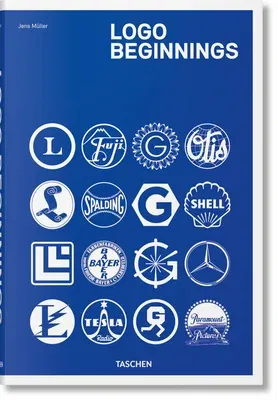Countless global brands, including Rolex, BMW, Louis Vuitton, and the
New York Yankees, still use logos that were designed over 100 years ago.
Yet there has never been a monograph devoted to the origins of logo
design. In the second half of the 19th century, the trademark replaced
traditional symbols such as the family coat of arms as a promotional and
identifying symbol for companies. At first, the designs were often still
figurative; only gradually did they develop into the abstract marks that
have become fixtures in everyday life today.
Author Jens Müller, described as the "logo detective" by Wired magazine,
examined historical trademark registers, international corporate
archives, and early design publications to unearth more than 6,000 logos
from 1870 to 1940. This unparalleled collection traces the development
of modern trademarks and sheds light on forgotten designs and early
versions of famous logos. The catalog is divided into four design
categories: "Figurative," "Form," "Effect," and "Typographical." Each
chapter is then systematically subdivided according to basic elements of
design such as circle, line, overlap, and outline, thus offering a new
perspective on design principles that are still relevant today.
Along with an extensive picture section, the book comprises an
introduction by Jens Müller on the history of the trademark as well as a
reproduction of the first comprehensive examination of modern corporate
logos: the influential design pioneer F.H. Ehmcke's (1878-1965)
illustrated essay "Wahrzeichen--Warenzeichen" (Symbols--trademarks) from
1921. Also included are ten case studies of famous trademarks, including
those of 3M, NBC, Shell, and Olivetti, and numerous rare images
illustrating the--at times varied, at times consistent--developments in
international logo design and the birth of the corporate identity. Logo
Beginnings is not only a fundamental and inspiring graphic design manual
but also an excellent read for anyone interested in social, cultural,
and corporate history and the fascinating impact of trademarks. It is
also the perfect complement to the TASCHEN classic Logo Modernism.

